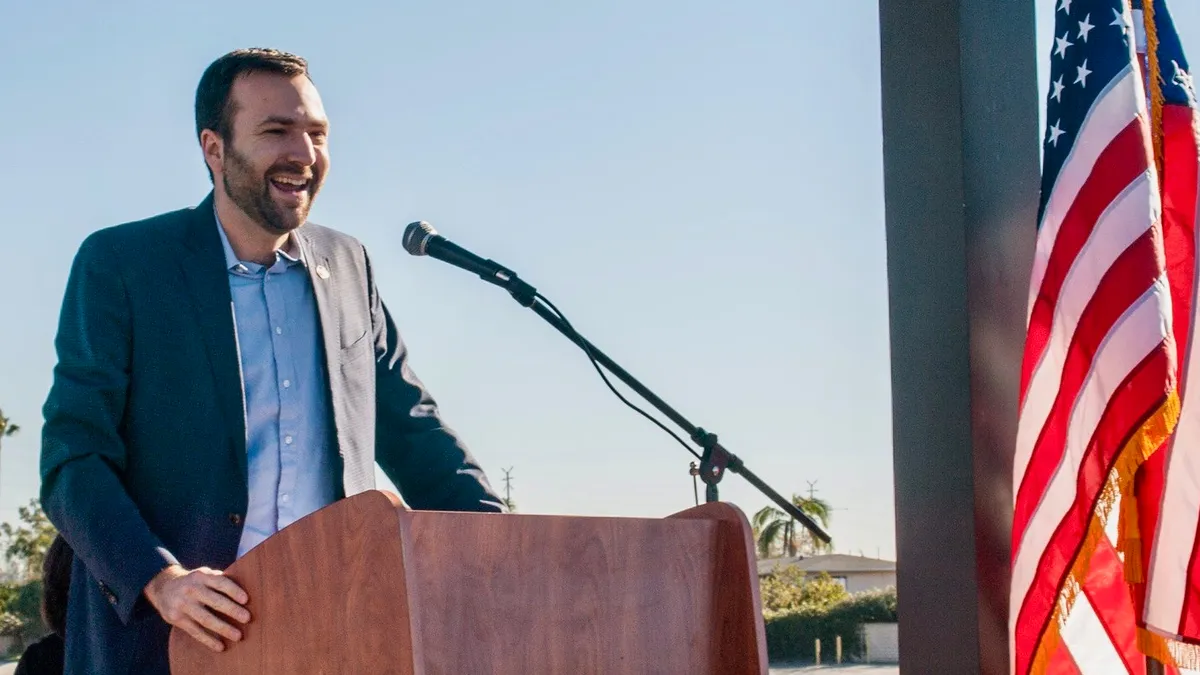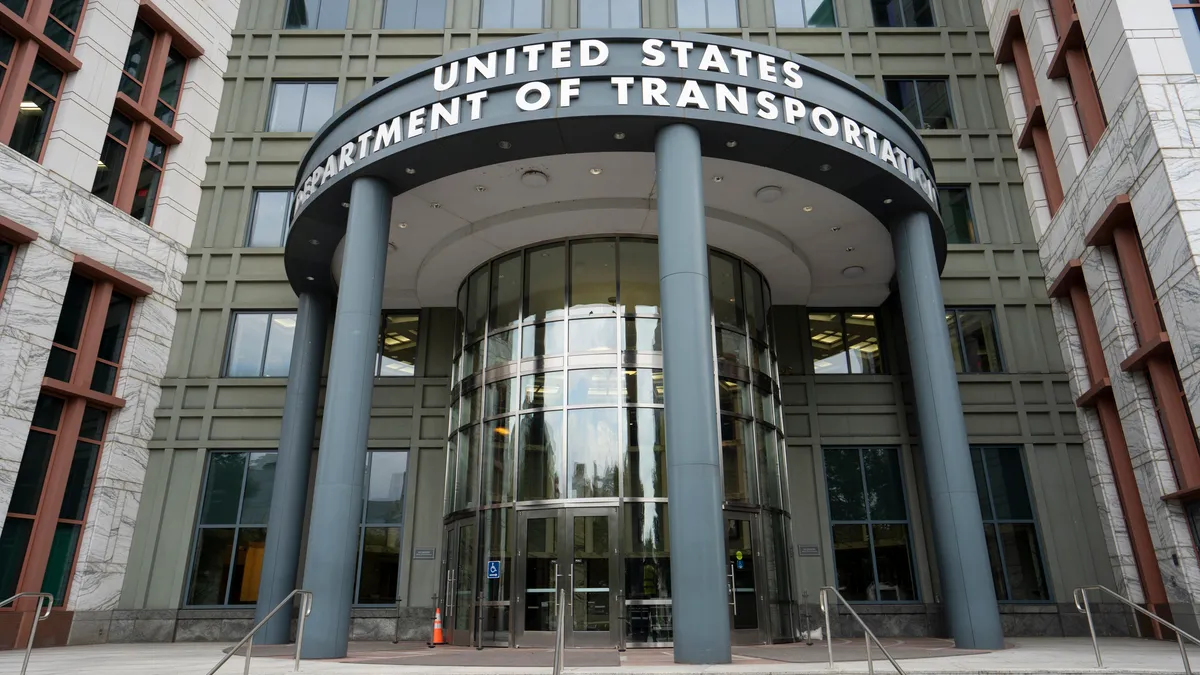UPDATE: September 16, 2019: The Circular Economy and Pollution Act did not pass before California's 2019 legislative session adjourned. It will likely be revisited in 2020.
California may be on the verge of passing recycling legislation that supporters expect will be so consequential it has global implications.
The Circular Economy and Pollution Reduction Act (AB 1080 and SB 54) contain a complex array of provisions geared toward two overarching goals. The identical bills could see a final vote today, the last day of California's legislative session.
First, all single-use packaging sold in California on or after Jan. 1, 2030 would have to be recyclable or compostable. In parallel, producers would also have to reduce waste generated from their products 75% by 2030. These targets go well beyond any other state or federal recycling mandates in the U.S., which one of the lead bill authors said is exactly the point.
"The technology is there, it exists today. We know we can scale this. We know we can do this and if we don't act soon we will continue to double down on a crisis that is drowning our cities, drowning our rivers and streams and our children," said SB 54 sponsor Sen. Ben Allen during a Wednesday Assembly committee hearing. "This is an opportunity here for global leadership."
Supporters see an opportunity to address the rising costs of litter clean-up and collapsed recycling markets by making producers step up.
Opponents see their financial interests being threatened, are wary of losing control under a potential extended producer responsibility (EPR) system or otherwise disagree with specific elements of the wide-ranging legislation.
If the legislation is passed, the state's Department of Resources Recycling and Recovery (CalRecycle) would lead a regulatory process to establish a framework by 2024 for meeting its targets. The agency testified it's uncertain how big that task might be, but is ready to tackle it.
"As drafted we do think the department can implement this bill," said CalRecycle Director Scott Smithline during the committee hearing. "This is a very significant program and it will require a significant response from the administration to implement."
Recyclers react
Given the options that producers could follow toward compliance (such as forming stewardship organizations), and the general uncertainty of a long regulatory process, this issue has split key players in California's recycling industry.
One of Sen. Allen's main industry supporters is Republic Services. Sitting together at the committee hearing, lobbyist Marc Aprea said certain details cause the company "some level of consternation," but added that "the alternative of no bill to Republic is not acceptable."
Still, the company remains keenly interested in seeing a separate infrastructure funding bill introduced in 2020, which Allen said he's committed to working on.
"This doesn't cut out the need for this industry at all ... In fact, if anything it just emphasizes the importance of that industry."

Ben Allen
State senator, SB 54 sponsor
Recology, another sizable player in the state, is also backing the measure. The employee-owned company has long been talking about the need for some form of producer payment to address market challenges, whether or not that ultimately means an EPR system as seen in other countries.
"EPR is a pretty broad term," Eric Potashner, vice president and director of strategic affairs, told Waste Dive. "I can see a system where the [packaging] industry is paying for optical sorters and secondary MRFs and building end markets here in the U.S. as an example of that."
Even with all of its recent investments in MRF equipment, Recology isn't sorting for specific materials within #3-7 plastics because it lacks market options.
"The industry should be on the hook for helping create that market," said Potashner, "or if there is not going to be a market for it they should create something else."
Other supporters with a stake in collection or processing include companies such as CR&R Environmental Services and local governments.
The largest industry opponent is Waste Management. The company has declined to comment on its position throughout the process, but sent a lobbyist to register opposition at the Wednesday hearing. EPR has repeatedly come up in the company's annual 10-K filings as something that "could have a fundamental impact on the waste, recycling and other streams we manage and how we operate our business, including contract terms and pricing."
Athens Services, the largest franchise contract holder in Los Angeles, is also opposed.
The California Refuse Recycling Council (CRRC) has taken a neutral stance, but a lobbyist for the group did raise concerns in the hearing about a perceived threat to "over a billion dollars of existing solid waste recycling infrastructure" if MRFs were to lose tonnage.
In response to these concerns, Sen. Allen emphasized "nobody's forced into it, including the haulers" and outlined why he believes the bill might create business opportunities.
"This doesn't cut out the need for this industry at all," he said. "In fact, if anything it just emphasizes the importance of that industry."
In a follow-up, CRRC reiterated it chose to stay neutral because it wants to work through the regulatory process and recognizes the need for action.
"We understand this is important policy to Californians," said Laura Ferrante, government affairs advocate for CRRC's northern district. "[A]s an organization of California companies, we want to work together to provide solutions to the single use plastic problem that is inclusive of the existing recycling system."
Producers and retailers
While the recycling industry's stance has been a factor, the reaction of consumer product companies, retailers and material associations have had greater influence on shaping the bill as it stands today. These players (or their members) will be directly on the hook for paying fees to fund the regulatory system and could also be liable for hefty financial penalties if targets aren't met.
The various twists and turns in bill language around these factors have made it hard for the most seasoned advocacy professionals in Sacramento to keep up.
A critical recent change was amending the bill to become material neutral and no longer just focus on single-use plastics. This moved the American Chemistry Council (ACC) from opposed to neutral, as explained in a Sept. 6 letter.
"I think it's fair to say that this puts all of our materials on the same playing field," Tim Shestek, ACC's senior director of state affairs, told Waste Dive. "We have a very ambitious goal to meet in terms of these recycling targets, but we're committed to working on it."
The new language also gained Dow's support, while the Plastics Industry Association remains opposed. Californians for Recycling and the Environment (a newly formed group with ties to bag manufacturer Novolex) and Dart Container are still opposed.
At the same time, the language's expanded scope moved the American Forest & Paper Association from neutral to opposed. The Glass Packaging Institute (GPI) has also come out in opposition, despite saying it supports the bill's broader intentions.
"There's no glass garbage patch in the Pacific Ocean," said GPI's lobbyist Mike Robson during the hearing. "The glass container industry does not want to be part of a regulatory scheme to create a circular economy ... for a package that's already a circular package."
The main concern is that glass could potentially be subject to regulatory fees under this program and California's existing bottle bill. Sen. Allen's latest amendment exempts those already covered under the container redemption program until 2026. This yielded an important shift to neutrality from the American Beverage Association and large beer companies.
"There's no glass garbage patch in the Pacific Ocean."

Mike Robson
Glass Packaging Institute lobbyist
Other notable amendments include eliminating a ban on non-compliant products, in favor of a fee, and creating recycling rate benchmarks in 2026 and 2028 ahead of the big 75% target for 2030. These various shifts have succeeded in securing neutral positions from many other large names such as Procter & Gamble, SC Johnson, Walmart, PepsiCo and many more. Some notable state groups representing retail and other sectors, such as the California Grocers Association, have also come out in direct support.
The Grocery Manufacturers Association (GMA) remains opposed, despite saying its members support broader goals of increasing recycled content levels and making packaging more recyclable. GMA CEO Geoff Freeman published an op-ed in local papers this week critiquing CalRecycle's abilities to handle this task, given the collapse of California's container redemption system, and called for separate infrastructure and education efforts before any talk of financially binding EPR.
"EPR focuses on who pays for the system and I think that misses the larger point," Meghan Stasz, GMA's vice president of packaging and sustainability, told Waste Dive. "Who writes the check doesn't actually fix the underlying recycling system."
What comes next
The Circular Economy and Pollution Reduction Act's fate may not be known until late into the night, given that today is the end of California's 2019 legislative session.
During a Wednesday webinar, Heidi Sanborn of the National Stewardship Action Council – one of the most closely involved groups on this issue – gave it at least a 60% chance of passage. Since then, sources indicate lobbying activity has continued at heightened levels from all sides, with behind-the-scenes support from Gov. Gavin Newsom's administration as of this morning.
Opponents and skeptics have asked why such a sweeping change has to be initiated in quick fashion, and whether it could wait until next year. The pending arrival of companion infrastructure funding legislation is highly anticipated. Sen. Allen, his cosponsors and supportive environmental advocacy groups say the issue is too urgent to delay.
"I think that we need a bill like this to force the process forward," Emily Rusch, executive director of CalPIRG, told Waste Dive. "If we require it, the infrastructure will be built."
"I think it's fair to say that this puts all of our materials on the same playing field."

Tim Shestek
Senior director of state affairs, American Chemistry Council
"In the face of unprecedented challenges from the loss of recycling markets and the growing plastic pollution crisis, the California legislature is taking decisive actions to redesign products, create in-state markets, and make producers responsible for the products they create," said Nick Lapis, director of advocacy for Californians Against Waste, in a statement.
If the legislation does go through, many have predicted that whatever gets hashed out in California will essentially become the national standard for packaging. The outcome of CalRecycle's potential regulatory process could also serve as a model, or perhaps be informed by, related EPR pushes going on in others at the moment too. Figuring out how to actually implement this system is bound to be an even more complex, and possibly contentious, process given just how high the stakes are for what California legislators are aiming to do.
"It's a big paradigm shift to have the producers be responsible for their products," said Jennie Romer, legal associate for the Surfrider Foundation's Plastic Pollution Initiative. "This isn't going to be over after Friday or after the governor signs the bill."
Correction: A prior version of this story misspelled Mike Robson's last name.






















